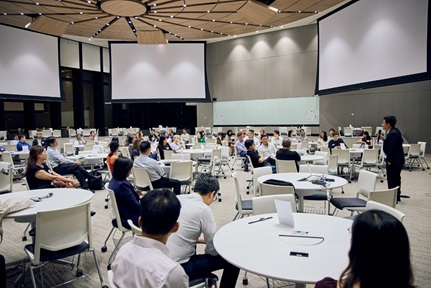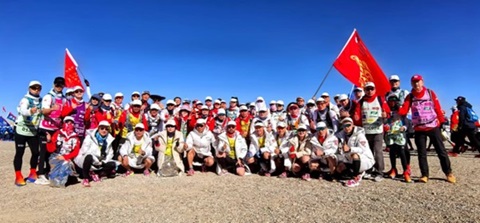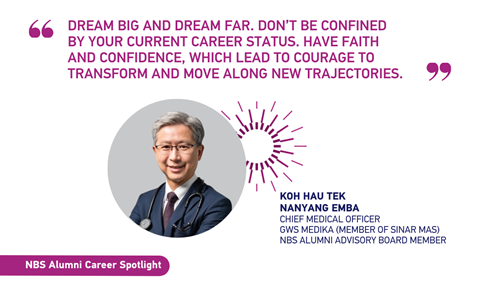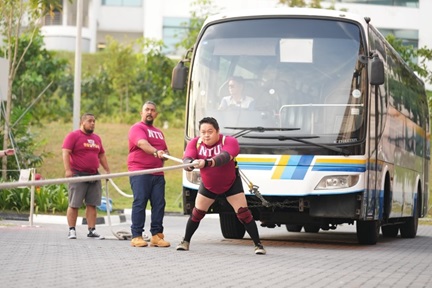THE STRATEGY ROOM; Medtech and the appetite for risk
In this commentary, Advanced MedTech CEO, Adj Assoc Prof Abel Ang said an openness to taking risks is key to growing Singapore's medtech sector.
How does a communications graduate end up leading what is arguably South-east Asia's largest medical device business?
He has a risk-taking nature, a love for learning and a mentor - Philip Yeo - to thank for it.
In fact, one of the best pieces of advice Abel Ang, CEO of Temasek-owned Advanced MedTech, has ever received came from Mr Yeo.
His former boss at Singapore's Economic Development Board (EDB) told him never to be afraid to do the impossible.
"Ultimately if you want to do great things, you have to be prepared to take some risks. We are not in the durian business where you have bao jiak - a sure guarantee, you know it's edible," said Mr Ang.
He believes this openness to taking risks is crucial to growing the medtech sector in Singapore. "The nature of medical devices and healthcare is that there is no 'sure win' or 'sure bet'. You will always be exposed to technology and innovation risk."
Those in startups would be familiar with risks associated with customer adoption or continued funding and support from stakeholders.
Large companies might not have to worry about those, but they also grapple with potential product failure or the reality that the amount spent on research and development might not result in the output they expected.
Mr Ang knows this well. While serving as senior adviser to the CEO of American medical devices company Integer, he got a call from Mr Yeo. The medtech division of Temasek-owned Accuron Technologies was on the decline but the business had a lot of unrealised potential, Mr Yeo told him. Will he help turn it around?
Mr Ang became CEO of Accuron MedTech in 2014 and helped streamline and innovate the business, which was eventually spun out and renamed Advanced MedTech.
Today, the company is a global player in urology devices and services.
From about US$90 million in sales when Mr Ang took over, it recorded US$250 million in revenue for the year ended March 2021 (including accounting for full-year results from a newly acquired company).
New age of medtech
Singapore's medtech industry has come a long way since Mr Ang left EDB in 2006 to get experience in the private sector.
That year, medtech manufacturing output was only at S$2.4 billion and the sector employed 6,625 people. This changed as Singapore built upon the conditions of its strong semiconductor industry and attracted more foreign multinational companies to its shores.
Last year, medtech manufacturing output hit over S$15 billion. About 50 regional headquarters of leading medtech firms are based in Singapore and the industry employs more than 16,000 people.
The city-state had a big role to play during the Covid-19 crisis too - a third of the world's thermal cyclers, or polymerase chain reaction (PCR) machines, are made in Singapore.
The way Mr Ang sees it, medtech's growth in the past decade comes on the back of a data revolution and the democratisation of healthcare.
With loads of data being created from the digitalisation of services, innovation can happen faster based on richer insights.
These days, information at the fingertips of patients allows them to make more informed decisions about their health - like whether to choose a Moderna or Sinovac vaccine.
"We don't live in a world where the doctor prescribes and the patient shuts up," said Mr Ang.
All this has also led to the rise of medtech startups in Singapore. According to Enterprise Singapore, there were over 300 homegrown medtech companies in 2020, more than double that of 2014. Over half of them were startups.
If these young companies are paying attention, they'll notice that the world of healthcare is moving towards integrated data platforms.
While services and medical devices used to work in silos, the new model of healthcare will integrate products, services, industry players and the community with several feedback loops throughout the value chain, said Mr Ang.
More pathfinders
Still, he reckons that one of the things the local ecosystem needs to improve on is building leaders in medical devices. Within the Asia-Pacific circle, the number of Singaporeans in top jobs is still lacking, noted Mr Ang.
Together with three other executives who have cut their teeth in the healthcare industry, he co-founded Asia Mentors Circle with a goal of nurturing 100 healthcare executives to take on senior leadership roles within the region in the next five years.
Opening doors for others is something Mr Ang feels strongly about. After graduating from Nanyang Technological University's communications school in 1997, he snagged a job at EDB despite the organisation's preference for engineering and economics graduates at the time - "somehow they managed to slip one through" - and eventually got promoted to work in Germany.
Then-chairman Mr Yeo later wanted him to come home and oversee the development of medical devices in Singapore. To get him ready, Mr Yeo paved the way for him to study a Master's degree in computational biology on a scholarship to the US.
Mr Ang was likely the only student in class who had never taken a programming course. "With strong family support and support from the EDB, I was able to get through. Having bosses that are prepared to take unnaturally risky bets on you helps," he said, laughing at the memory.
With a strong foundation built during his years in EDB, Mr Ang later left for American medtech company Hill-Rom and rose up the ranks to become chief technology officer. He eventually ended up in Integer, where he got that fateful call from Mr Yeo a few years later.
Despite everything, that communications degree did come in handy. Over the past few years, Mr Ang has penned thought leadership pieces for news outlets, with topics ranging from the perils of the gig economy to his simple life in a public housing flat.
In March, Mothership published his heartfelt letter to his 18-year-old son, where he talked about his "inexplicable fear" of fatherhood after his own dad died when he was seven and left no role model.
Now that he has had the benefit of mentorship and life experience, he tries to help university students in their professional journey (Mr Ang is also an adjunct professor).
Many of these students tend to overestimate the risk they are taking, and it's his job to help them better understand the risk-reward profile.
The same goes for startup founders. Advanced MedTech has made investments in a number of startups including AWAK Technologies, which is developing a portable device for peritoneal dialysis.
That said, the best founders are not only risk-takers, but have a clear understanding of their purpose.
"You don't have to build a massive platform for a whole therapy indication area. You need to make a decision on what aspect of healthcare you're going to make a change in. And when you do it well, and do it in a way that the customer gets it, then you will be successful," added Mr Ang.
Source: The Business Times





.tmb-listing.png?Culture=en&sfvrsn=64dc3641_1)
